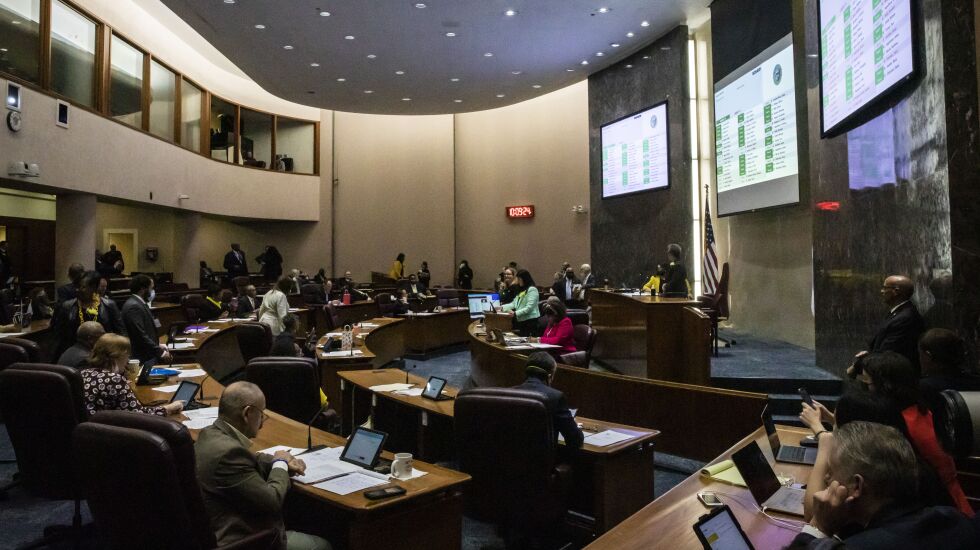
The Chicago City Council has “buried its rubber stamp” under Lori Lightfoot, with the mayor facing twice as many divided roll calls and more delays and compromises on key legislation than her two predecessors, a new report shows.
Lightfoot likes to say the City Council is not a rubber stamp for her because “I don’t buy votes.”
The new study by the political science department of the University of Illinois at Chicago draws no conclusion about why the City Council has stopped providing knee-jerk support from the mayor.
It simply documents that the unanimous votes that were routine under former Mayors Richard M. Daley and Rahm Emanuel are a thing of the past under Lightfoot.
From June 12, 2019, through March 23, 2022, Lightfoot survived 131 divided roll calls — including a 29-to-21 vote on her “pandemic” 2021 budget and passage of a $94 million property tax increase that same year with just two votes to spare.
That’s compared to just 54 during the last of Daley’s six terms and 67 divided roll calls during the first of Emanuel’s two terms.
Daley and Emanuel routinely had 100% support from “seven or eight” alderpersons and average support well above 90%. Under Lightfoot, there is not a single 100-percenter. The average voting record is 84%.
Three members of Lightfoot’s leadership team — Finance Chair Scott Waguespack (32nd), Workforce Development Chair Susan Sadlowski Garza (10th) and Pedestrian and Traffic Safety Chair Walter Burnett Jr. (27th) — supported Lightfoot 99% of the time.
The biggest contrarian was mayoral challenger Ray Lopez (15th), who supported the mayor’s budgets, initiatives and programs just 38% of the time.
That was followed by Anthony Napolitano (41st) at 56%; Anthony Beale (9th) at 60%; Jim Gardiner (45th) at 63%; Brendan Reilly (42nd) and Edward Burke (14th) at 68%; and Marty Quinn (13th) and Silvana Tabares (23rd) at 69%.
Mayoral challenger Roderick Sawyer (6th), who entered the race last week with an attack on the incumbent’s “mean-spirited” and “uncollaborative” style of governing, voted with Lightfoot 95% of the time.
That could undermine Sawyer’s argument that Lightfoot’s contentious relationship with the City Council has made it more difficult for her to get things done.
Former independent Ald. Dick Simpson (44th) is a principal author of the study. He endorsed Lightfoot four years ago and vowed to do so again.
But Simpson argued Monday that the “numbers don’t lie” in spite of his political bias.
The City Council is edging “closer to a real legislative body” with far more delay and debate. That’s even though Lightfoot ultimately gets her way with “four significant voting blocs”: moderate-liberal; progressive-socialist; conservative; and the Chicago machine.
“She does have to compromise. She does have to hold back some legislation — like [getting rid of] aldermanic privilege over zoning. She can’t just say, ‘I’ll give you a new Burger King, a zoning change or a city project’ and get votes and she doesn’t attempt to,” Simpson said.
Lightfoot has spurned conventional legislative horse-trading in favor of playing hardball — like the time she famously warned members of the Black Caucus who dared to vote against her 2021 city budget, “Don’t ask me for s—t” when it comes to choosing projects for her five-year capital plan.
Even so, she managed to pass “all of her legislation in some form” and has not been forced to exercise her veto power, Simpson said.
“She has won her way. But it’s been through argumentation, putting together coalitions and, of course, she has her biggest support group from among the committee chairs and what we call the `moderate-liberal bloc.’ Which is some committee chairs, some from the Black Caucus and some from the Progressive Caucus,” Simpson said.
If Lightfoot manages to win her uphill battle for a second term, Simpson said the mayor would be wise to steer clear of “personality disputes” that have characterized her first term.
That includes a recorded, obscenity-laced tirade against Lopez after the first of two devasting rounds of looting and a finger-pointing confrontation with Ald. Jeanette Taylor (20th) on the floor of the City Council.
Simpson also advised the mayor to wait until a second term before using the racketeering indictment of former Illinois House Speaker Mike Madigan to renew her push to eliminate aldermanic prerogative over zoning amid resounding opposition from her closest allies.
“If she wins with a significant majority of the vote, she will have the kind of mandate that, I think, the aldermen will have to cave under,” Simpson said.
“The other option is to put it up for a vote just before the election. That’s how the first ethics ordinance passed in 1987.”
Lopez accused Simpson of attempting to “put a positive spin” on the fact that he and his colleagues have chosen “not to be members of the go-along, get-along gang.”
“It doesn’t mean she compromised when these divided votes happen. It just means that she pushed ’em through with lower majorities,” Lopez said.
“That is more dangerous than a rubber stamp. It means that you’re choosing to ignore the opinion of the minority or those who disagree with you just for the sake of getting a win. There is no compromise with this mayor.”
Report not displaying properly? Click on “City Council Buries Its Rubber Stamp.”
Tables not displaying properly? Click on Voting Tables







